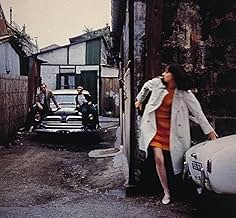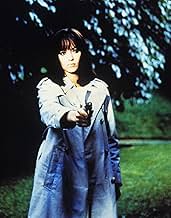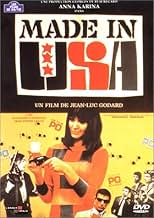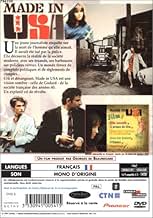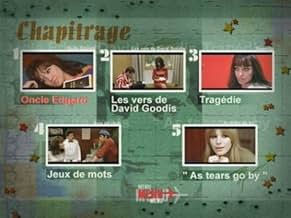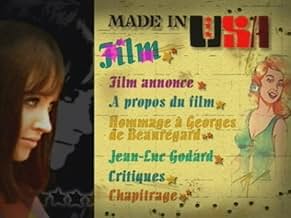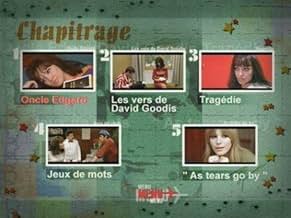Paula Nelson deberá investigar en Atlantic City (Francia) la muerte de su amante, investigación que se presentará peligrosa debido a la atención que ésta consigue despertar entre los mafioso... Leer todoPaula Nelson deberá investigar en Atlantic City (Francia) la muerte de su amante, investigación que se presentará peligrosa debido a la atención que ésta consigue despertar entre los mafiosos de la ciudad.Paula Nelson deberá investigar en Atlantic City (Francia) la muerte de su amante, investigación que se presentará peligrosa debido a la atención que ésta consigue despertar entre los mafiosos de la ciudad.
- Dirección
- Guionistas
- Elenco
- Paula Nelson
- (as AK)
- Richard Widmark
- (as LS)
- Donald Siegel
- (as JPL)
- David Goodis
- (as YA)
- Man with Marianne Faithfull
- (sin créditos)
- Policeman
- (sin créditos)
- Richard Nixon
- (sin créditos)
- Inspector Aldrich
- (sin créditos)
- Bill Poster
- (sin créditos)
- Barman
- (sin créditos)
- Workman in bar
- (sin créditos)
- Dental Assistant
- (sin créditos)
- Richard Politzer
- (voz)
- (sin créditos)
- Robert MacNamara
- (sin créditos)
- Girl in Bandages
- (sin créditos)
- Doris Mizoguchi
- (sin créditos)
- Self
- (sin créditos)
- Dirección
- Guionistas
- Todo el elenco y el equipo
- Producción, taquilla y más en IMDbPro
Opiniones destacadas
The often curious soundtrack features a passing jet aircraft (or is it an express train?) which always obscures the surname of Karina's mysterious, deceased lover in a fashion that Tarrentino late used to obscure the name of the'The Bride' in KILL BILL.
What's it all about? No idea! But the film, or maybe the style, certainly the luminous Karina, does somehow get under your skin and even though I found it hard to endure on a first viewing I'm increasingly keen to watch it once again . Amongst the mind-boggling strangeness I'm sure I must have missed something vital....now, where is that DVD?
It seems the real inspiration behind this was the disappearance of a prominent Moroccan leftist leader in Paris, Ben Barka. One can imagine the scandal caused at the time, how much it said about France and the West, especially to someone like Godard who would be attuned to receive it.
The first thing to glean then is that instead of filming the outrage, the obscuring of truth and malaise, using fiction, Godard reverts back to image and cinema, about fiction. To that effect he plucks a potboiler story from a book about a woman who travels to a coastal town where her revolutionary lover has told her to meet him only to find him mysteriously dead, but instead of filming the mystery and noir conspiracy, Godard films a disjointed tapestry of image and citation.
There are many of these, quotes, abrupt cuts and insertions, ruminations on camera, agitprop played from tape-recorders, all first of course Godard's fooling with cinema to see what it is made of, but moreover his oblique way of delivering the obscuring of truth, the disjointed nature of living in a world where people can mysteriously disappear and we can only grasp at fictions. As more of an afterthought he can joke that this knot of indecipherable plot is his version of The Big Sleep.
More fascinating is what all this shows of Godard. There's a bourgeois intellectual in him, that side of him he would run away from after Weekend, who wants to present his view of a concave reality, but none of it deep, transformative or unsettling, always thinly exposing thin artifice. There's of course talk of Disney and Bogart, there's a Rue Preminger, an inspector Aldrich. Tarantino- isms.
But also a spiritual side of him, a burning desire to transcend the clutter of narratives and mind; at one point Anna Karina whispers about how she would rather have nothing instead of everything as a way of reaching the absolute, it's this absolute that likely he chased in the chimera of politics and beyond. He doesn't know yet that this nothingness is not only another thought or another belief but a cessation of thought, a suspension of disbelief. He would later.
It's this other Godard who is a gentle soul, contains the child fascinated by image, the poet fascinated by love, perhaps not the philosopher troubled by being which was only more thought stood in his way. This side is as stifled here, unable to pierce through the cutouts, as it was after Weekend when he wasted his talent in things like Pravda, and was only really let flourish in the 90s, his transcendent period when you must find him again.
Made in USA, so Godard claims, is a remake of the Big Sleep. But, and it should be noted up top, I don't think we can believe him. Part of the fun is dealing with how he will lie to you, treat you with contempt, and/or in general mess with your head. There are constant interruptions in the film, Godard forces you to face the fact you are watching a film and to size it up constantly. Godard doesn't exist to watch on auto pilot; he wants you to analyze the act of viewing. It can be infuriating, especially when he removes action sequences or very awkwardly names characters/places "Otto Preminger" or "Richard Widmark." The political statements get a little heavy handed as well, though treated with humor.
As much fun as I find the film, and this entire period of Godard, watching a film like this or Pierrot Le Fou or 2 or 3 Things About Her or Weekend is work. You are expected to be actively involved. If you want to be told a story or feel like you are looking into another world, maybe Made in USA is not for you. And that's cool, these films are obnoxious and pretentious. But it can be extremely rewarding if you are willing to admit you may not "get" chunks of the film and maybe enjoyment will only kick in after thinking about the movie for a couple days. That sounds like faint praise, but Made in USA is an audacious, bold, exciting film that makes you confront what you always took for granted in classic Hollywood.
Yeah, sure I admit his historical value, the man made a huge change in to the course of film making, and I respect him for that. I have also read Godard's book about the structure and nature of film, and found it very fascinating. Still, for a man who knows a lot about the structure of cinema, a decision to throw every single characteristic in storytelling away, feels very strange to me. It just doesn't work. He, if anybody should know, that they don't exist for nothing.
I can see why he achieved this "film god" status. He was something never seen before, something outrageous. But hey people, let's face it. An hour long political essay disguised as a movie is not "beutifully poetic" or what ever you want to call it. It's just plain boring. No one ever has anything else to say about Godard's movies, than they are "surrealistic" and have such a "strangely poetic mood" in them. Like it's some kind of a magnitude. Poetic or not, The characters are unidimensional and flat.
If you want poetic movies with surrealistic mood, I suggest you to watch for example Robert Bresson's, Andrei Tarkovsky's or Krzysztof Kieslowski's films. They have a lot more in them than just the mood.
** (out of 4)
Jean-Luc Godard's homage to American film noir has a mysterious woman (Anna Karina) trying to figure out who killed her former lover. The woman travels throughout France questioning various men trying to figure out who was behind the murder while the viewer tries to figure out why they're bothering watching the film. There's no question that Godard is a legend of the screen but there's also no question that many, many people hate him. Hate's too strong of a word but I do admit that I think the director likes to be frustrating and the more people he makes mad I'm sure the happier he is. The story itself really isn't all that interesting and I found it funny that Godard had said in interviews that he was influenced by the Humphrey Bogart classic THE BIG SLEEP. The two films have very little in common and I'd say there's also very little homage to the classic noirs of the 40s and 50s. For the most part the film succeeds in being weird but like most Godard movie it's still well-made no matter how silly, boring and stupid it gets. I think what I liked most about the film were the colors that Godard uses on our main character. When we first see her she's wearing a multi-color dress and throughout the movie her wardrobe is clearly the most interesting and entertaining thing on the screen. I liked the way Godard used this colors to really light up the scene just like filmmakers would use shadow and fog to bring to life their noirs. The story itself I found to be very uninteresting and there wasn't a single second where I cared what was going on and I certainly didn't care who killed the former lover. I'm sure some Godard fans would say that was what the director was going for and I'd personally believe this but at the same time I just don't fall into the group who believes you can be pointless and unconventional and make it entertaining. The performances are pretty good for what they are but none of them really jump out at you. The film has fun mentioning earlier films and we even get Bogart's name thrown up and one character is named Richard Widmark. MADE IN U.S.A. is a film that I'm sure has some fans but I found it rather hard to sit through even though it's well-made.
¿Sabías que…?
- TriviaThough based on "The Jugger" by Richard Stark (Donald E. Westlake), the author received no compensation for this adaptation. Westlake, who passed away at the end of 2008, successfully kept the film from being shown in the US during his lifetime.
- Citas
Marianne Faithfull: It is the evening of the day / I sit and watch the children play / Smiling faces I can see / But not for me / I sit and watch / As tears go by / My riches can't buy everything / I want to hear the children sing / All I hear is the sound / Of rain falling on the ground / I sit and watch / As tears go by / It is the evening of the day / I sit and watch the children play / Doing things I used to do / They think are new / I sit and watch / As tears go by
- ConexionesEdited into Bande-annonce de 'Made in U.S.A.' (1966)
- Bandas sonorasAs Tears Go By
Written by Mick Jagger, Keith Richards and Andrew Loog Oldham
Performed by Marianne Faithfull
Selecciones populares
- How long is Made in U.S.A?Con tecnología de Alexa
Detalles
Taquilla
- Presupuesto
- USD 50,000 (estimado)
- Total en EE. UU. y Canadá
- USD 95,209
- Fin de semana de estreno en EE. UU. y Canadá
- USD 11,147
- 11 ene 2009
- Total a nivel mundial
- USD 95,304
- Tiempo de ejecución
- 1h 30min(90 min)
- Mezcla de sonido
- Relación de aspecto
- 2.35 : 1


